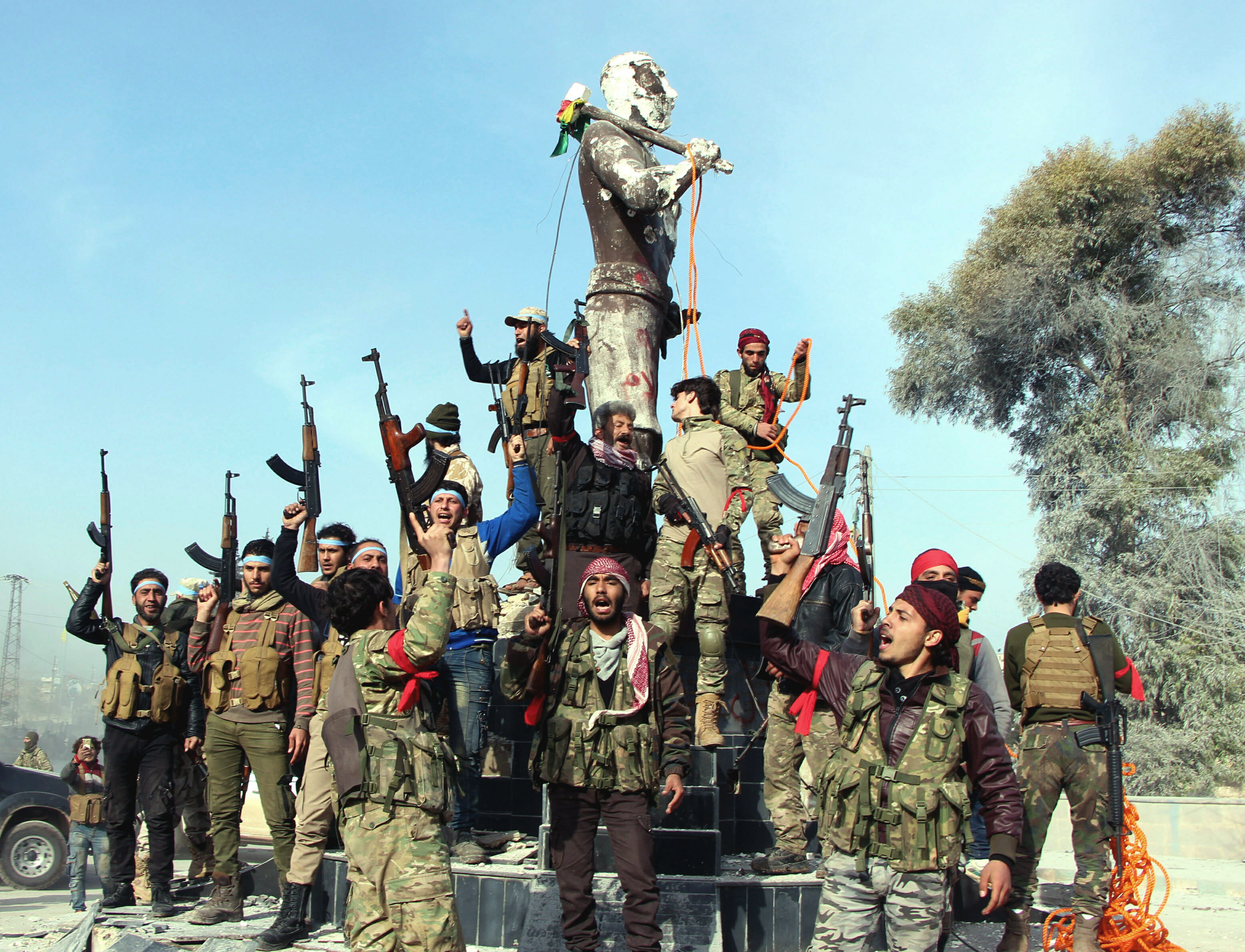Turkish-Backed Forces Seize Syrian-Kurdish City of Afrin
Turkish President Recep Tayyip Erdogan achieves an important objective by taking control of a key area from Kurdish fighters. Turkey-backed Free Syrian Army soldiers celebrate around a statue of Kawa, a mythology figure in Kurdish culture, on Sunday as they prepare to destroy it in the center of Afrin, a city in northwestern Syria. (Hasan Kırmızitaş/DHA-Depo Photos via AP)
Turkey-backed Free Syrian Army soldiers celebrate around a statue of Kawa, a mythology figure in Kurdish culture, on Sunday as they prepare to destroy it in the center of Afrin, a city in northwestern Syria. (Hasan Kırmızitaş/DHA-Depo Photos via AP)
Turkish-backed forces known as the Free Syrian Army took full control of the center of Afrin, a Syrian-Kurdish city, on Sunday. The attack was part of Operation Olive Branch, launched Jan. 20 in an effort to eliminate Kurdish militia on the Turkish-Syrian border.
According to activists, 280 civilians have been killed in the campaign.
To see an Associated Press report on Turkey and military activities in Syria, click here.
The BBC’s Mark Lowen reports from Turkey:
President [Recep Tayyip] Erdogan has achieved his twin objectives: to remove a key area under YPG control and to rally the vast majority of Turks behind their commander-in-chief. The jingoism here has been breathtaking. Targeting the Kurdish militants, Turkey’s age-old enemy, is a rare uniting force in a polarised country. Those who have spoken out—several hundred—have been detained for “terrorism propaganda”.
The question now is whether Turkey pushes on to other YPG-held areas, namely Manbij, which could put Turkish troops in direct conflict with US soldiers there who see the YPG as allies. That depends on talks between Ankara and Washington, and the sacking of Secretary of State Rex Tillerson last week removes an important interlocutor for Turkey.
The risk in Afrin is that many residents who will return are Kurdish and could see Turkey as the aggressor. Tearing down a Kurdish statue in the town centre doesn’t augur well. Will the Afrin operation actually push more local people into the arms of the YPG?
Turkish military spokesman Bekir Bozdag said the campaign would continue around Afrin until the area was fully secure.
The military operation stems from Turkey’s belief that the Kurdish militia known as People’s Protection Units (YPG) is an extension of the banned Kurdistan Worker’s Party (PKK), which has fought for Kurdish autonomy in southeastern Turkey for decades. The YPG denies any organizational links to the PKK.
The campaign complicates U.S. plans in Syria. In the week before Operation Olive Branch began, the United States declared a military coalition with the Kurds against Islamic State in Syria. At the time, Turkish President Erdogan called that coalition a “terror army.”
Meanwhile, the Syrian army, with the support of Russian airstrikes, has pushed into eastern Ghouta, near Damascus. The government assault appears to have captured 80 percent of the enclave.
Your support matters…Independent journalism is under threat and overshadowed by heavily funded mainstream media.
You can help level the playing field. Become a member.
Your tax-deductible contribution keeps us digging beneath the headlines to give you thought-provoking, investigative reporting and analysis that unearths what's really happening- without compromise.
Give today to support our courageous, independent journalists.
You need to be a supporter to comment.
There are currently no responses to this article.
Be the first to respond.